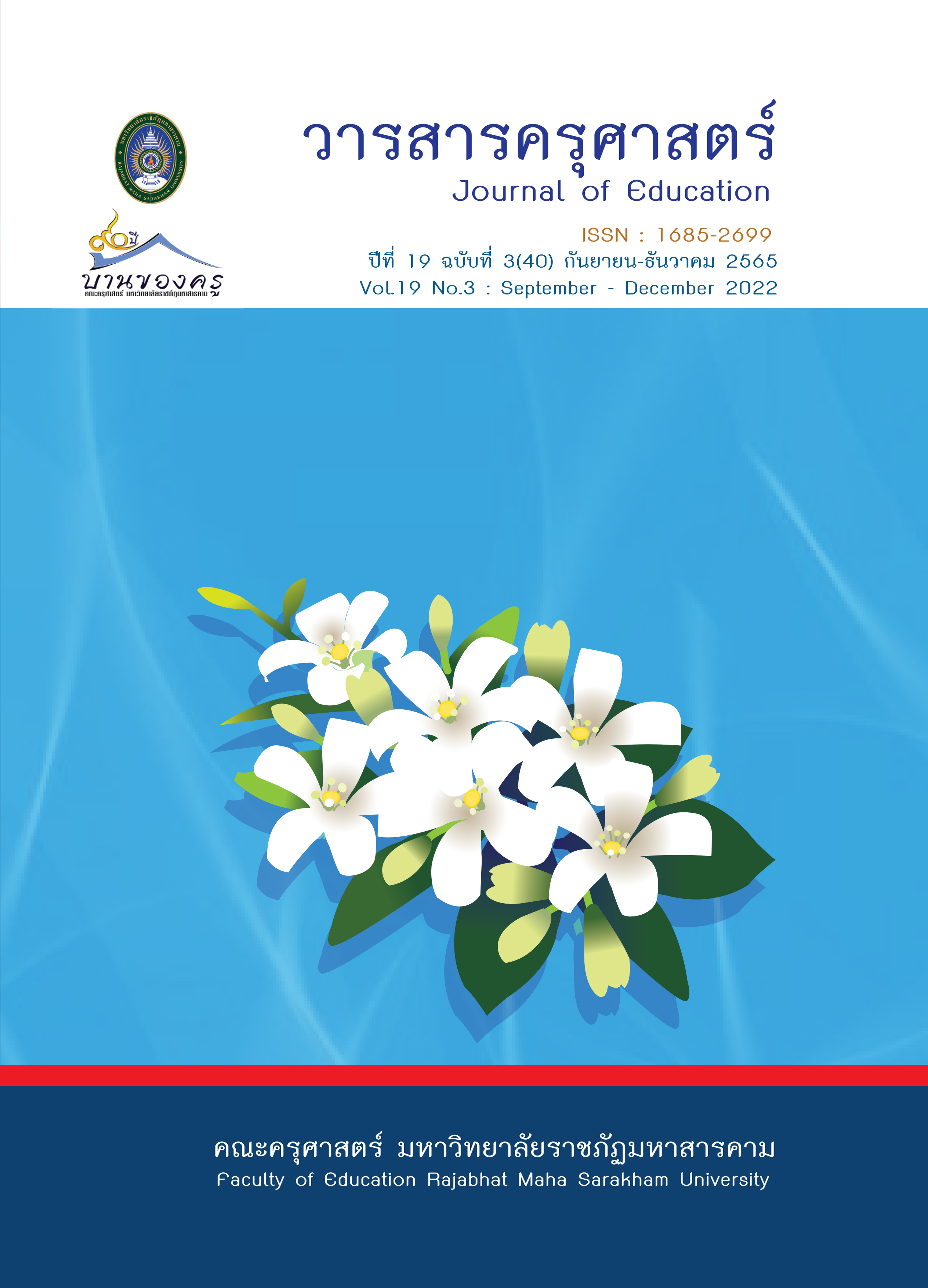แนวทางการพัฒนาภาวะผู้นำเชิงสร้างสรรค์ของผู้บริหารสถานศึกษา สังกัดสำนักงานเขตพื้นที่การศึกษาประถมศึกษามหาสารคาม เขต 1
Main Article Content
บทคัดย่อ
การวิจัยครั้งนี้มีวัตถุประสงค์ เพื่อ 1) ศึกษาสภาพปัจจุบันและสภาพที่พึ่งประสงค์ของภาวะผู้นำเชิงสร้างสรรค์ของผู้บริหารสถานศึกษา และ 2) ศึกษาแนวทางพัฒนาภาวะผู้นำเชิงสร้างสรรค์ของผู้บริหารสถานศึกษาโดยใช้วิธีดำเนินการวิจัยและพัฒนา 2 ระยะ คือ ระยะที่ 1 ศึกษาสภาพปัจจุบันและสภาพที่พึงประสงค์ของภาวะผู้นำเชิงสร้างสรรค์ของผู้บริหารสถานศึกษา กลุ่มตัวอย่างคือ บุคลากรทางการศึกษา จำนวน 332 คน เครื่องมือที่ใช้ในการวิจัยเป็นแบบสอบถาม ระยะที่ 2 ศึกษาแนวทางพัฒนาภาวะผู้นำเชิงสร้างสรรค์ของผู้บริหารสถานศึกษา เครื่องมือที่ใช้เป็นแบบสัมภาษณ์ผู้ทรงคุณวุฒิ 9 คน วิเคราะห์ข้อมูลโดยการวิเคราะห์เนื้อหา
ผลการวิจัยพบว่า 1) การมีภาวะผู้นำเชิงสร้างสรรค์ของผู้บริหารสถานศึกษา โดยรวมและรายด้าน ระดับมากที่สุด ได้แก่ ด้านการมีความคิดสร้างสรรค์ ด้านการทำงานเป็นทีม ด้านการมีวิสัยทัศน์ ด้านการมีความยืดหยุ่นและปรับตัว ด้านคำนึงถึงความเป็นปัจเจกบุคคล และ 2) แนวทางการพัฒนาภาวะผู้นำเชิงสร้างสรรค์ของผู้บริหารสถานศึกษา คือ โปรแกรมพัฒนาภาวะผู้นำเชิงสร้างสรรค์ ประกอบด้วย 1) หลักการ 2) วัตถุประสงค์ 3) เนื้อหา 4) กิจกรรมการพัฒนาและ 5) การวัดแลประเมินผล มี 5 โมดูล คือ โมดูล 1 ด้านการมีความคิดสร้างสรรค์ โมดูล 2 ด้านการทำงานเป็นทีม โมดูล 3 ด้านการมีวิสัยทัศน์ โมดูล 4 ด้านการมีความยืดหยุ่นและปรับตัว โมดูล 5 ด้านคำนึงถึงความเป็นปัจเจกบุคคล ผลการประเมินโปรแกรม พบว่ามีความเหมาะสมและมีความเป็นไปได้อยู่ในระดับมากที่สุด
Article Details

อนุญาตภายใต้เงื่อนไข Creative Commons Attribution-NonCommercial-NoDerivatives 4.0 International License.
ข้อกำหนดเบื้องต้นที่ผู้นิพนธ์(ผู้ส่งบทความ) ควรทราบ
1. ผู้นิพนธ์ที่ประสงค์จะลงตีพิมพ์บทความกับวารสาร ตั้งแต่เดือนมกราคม 2563 เป็นต้นไป ให้ใช้รูปแบบใหม่ (Template 2563) โดยสามารถดูตัวอย่างได้ที่เมนู GUIDELINES
2. จะตีพิมพ์และเผยแพร่ได้ ต้องผ่านการประเมินจากผู้ทรงคุณวุฒิ (Peer Review)
3. การประเมินบทความโดยผู้ทรงคุณวุฒิ (Peer Review) เป็นแบบ Double Blind
4. การอ้างอิงบทความใช้หลักเกณฑ์ APA (American Psychological Association) คลิก
5. บทความถูกปฏิเสธการตีพิมพ์ ไม่ผ่านการประเมิน ผู้นิพนธ์ขอยกเลิกเองหรือชำระเงินก่อนได้รับการอนุมัติ ทางวารสารไม่มีนโยบายการคืนเงิน
เอกสารอ้างอิง
กิตติ์กาญจน์ ปฏิพันธ์. (2555). โมเดลสมการโครงสร้างภาวะผู้นำเชิงสร้างสรรค์. [วิทยานิพนธ์ดุษฎีบัณฑิต ไม่ได้ ตีพิมพ์]. มหาวิทยาลัยขอนแก่น.
เชษฐา ค้าคล่อง. (2557). การพัฒนาโปรแกรมเสริมสร้างภาวะผู้นำแบบมุ่งบริการของผู้บริหารสถานศึกษา
ขั้นพื้นฐาน. [วิทยานิพนธ์ปริญญาการศึกษาดุษฎีบัณฑิต ไม่ได้ตีพิมพ์]. มหาวิทยาลัยมหาสารคาม.
นเรศ บุญช่วย. (2553). “แผนกลยุทธ์เพื่อพัฒนาภาวะผู้นำเชิงสร้างสรรค์ที่เหมาะสมสำหรับผู้บริหารสถานศึกษา”. [วิทยานิพนธ์ปริญญาครุศาสตรดุษฎีบัณฑิต ไม่ได้ตีพิมพ์]. บัณฑิตวิทยาลัย มหาวิทยาลัยราชภัฏวไลย อลงกรณ์ในพระพรมราชูปถัมภ์.
บุญชม ศรีสะอาด. (2560). การวิจัยเบื้องต้น (พิมพ์ครั้งที่ 10). สุวีริยสาสน์.
ไพฑูรย์ สินลารัตน์. (2553). ผู้นำเชิงสร้างสรรค์และผลิตภาพ: กระบวนทัศน์ใหม่และผู้นำใหม่ (พิมพ์ครั้งที่ 2). จุฬาลงกรณ์มหาวิทยาลัย.
ไพศาล วรคำรัตน์. (2562). การวิจัยทางการศึกษา (พิมพ์ครั้งที่ 10). ตักศิลาการพิมพ์.
สำนักงานเขตพื้นที่การศึกษาประถมศึกษามหาสารคาม เขต 1. (2563). รายงานประจำปี 2563. สำนักงานเขตพื้นที่ การศึกษาประถมศึกษามหาสารคาม เขต 1.
สำนักงานคณะกรรมการการพัฒนาเศรษฐกิจและสังคมแห่งชาติ. (2560). แผนพัฒนาเศรษฐกิจและสังคมแห่งชาติ ฉบับที่ 12 (พ.ศ.2560-2564). สำนักงานคณะกรรมการการพัฒนาเศรษฐกิจและสังคมแห่งชาติ.
สำนักงานเลขาธิการสภาการศึกษา. (2560). แผนการศึกษาแห่งชาติ พ.ศ.2560-2579 (พิมพ์ครั้งที่ 1). พริกหวาน กราฟฟิค.
สุเทพ พงศ์ศรีวัฒน์. (2549). ภาวะผู้นำ:ทฤษฎีและปฏิบัติ : ศาสตร์และศิลป์สู่ความเป็นผู้นำที่สมบูรณ์ (พิมพ์ครั้งที่ 2).
วิรัตน์ เอ็ดดูเคชั่น.
สุวิทย์ ยอดสละ. (2556). การพัฒนาภาวะผู้นำเชิงวิสัยทัศน์ของผู้บริหารโรงเรียนประถมศึกษาสังกัดสำนักงาน
คณะกรรมการศึกษาขั้นพื้นฐาน. [วิทยานิพนธ์ปริญญาการศึกษาดุษฎีบัณฑิต ไม่ได้ตีพิมพ์]. มหาวิทยาลัยมหาสารคาม.
สุวิมล ว่องวาณิช. (2558). การวิจัยประเมินความต้องการจำเป็น (พิมพ์ครั้งที่ 3). สำนักพิมพ์แห่งจุฬาลงกรณ์ มหาวิทยาลัย.
เสริมศักดิ์ วิศาลาภรณ์. (2552). ภาวะผู้นำและความขัดแย้ง. มหาวิทยาลัยศรีนครินทรวิโรฒ.
อุดม มุ่งเกษม. (2545). Good Governance กับการพัฒนาข้าราชการ. สถาบันพัฒนาข้าราชการพลเรือน.
Robinson, R. B. Jr. (2007). Strategic Management : Formulation, Implementation, and Control. McGraw Hill
International Edition.


